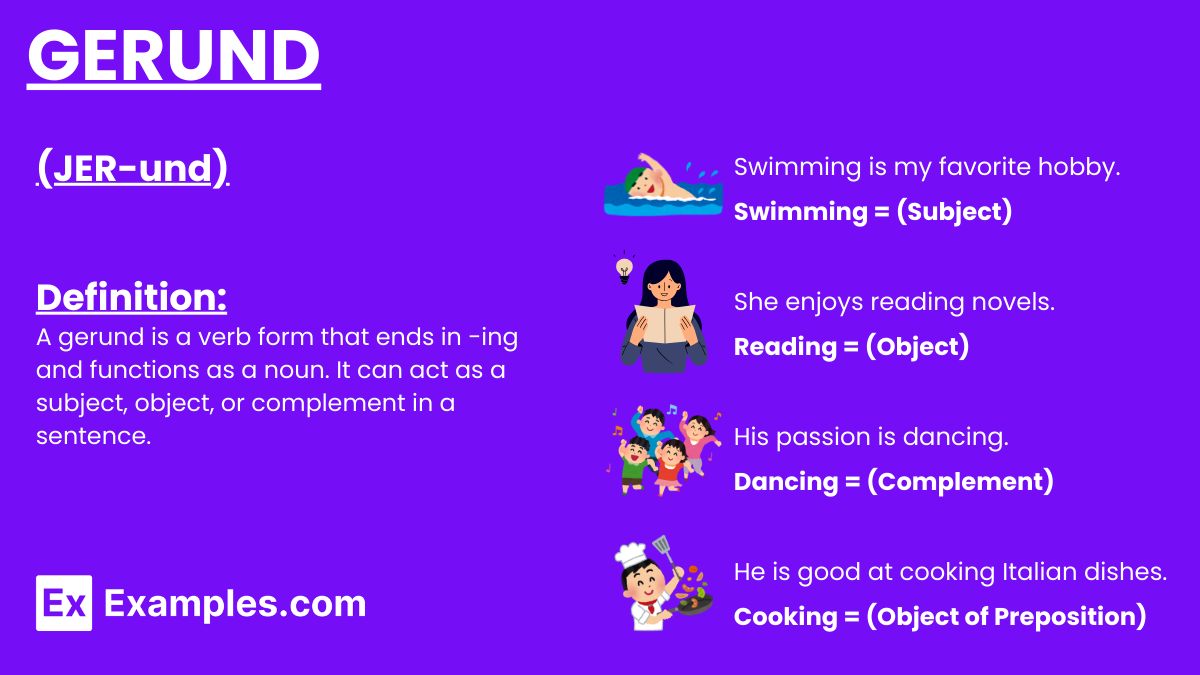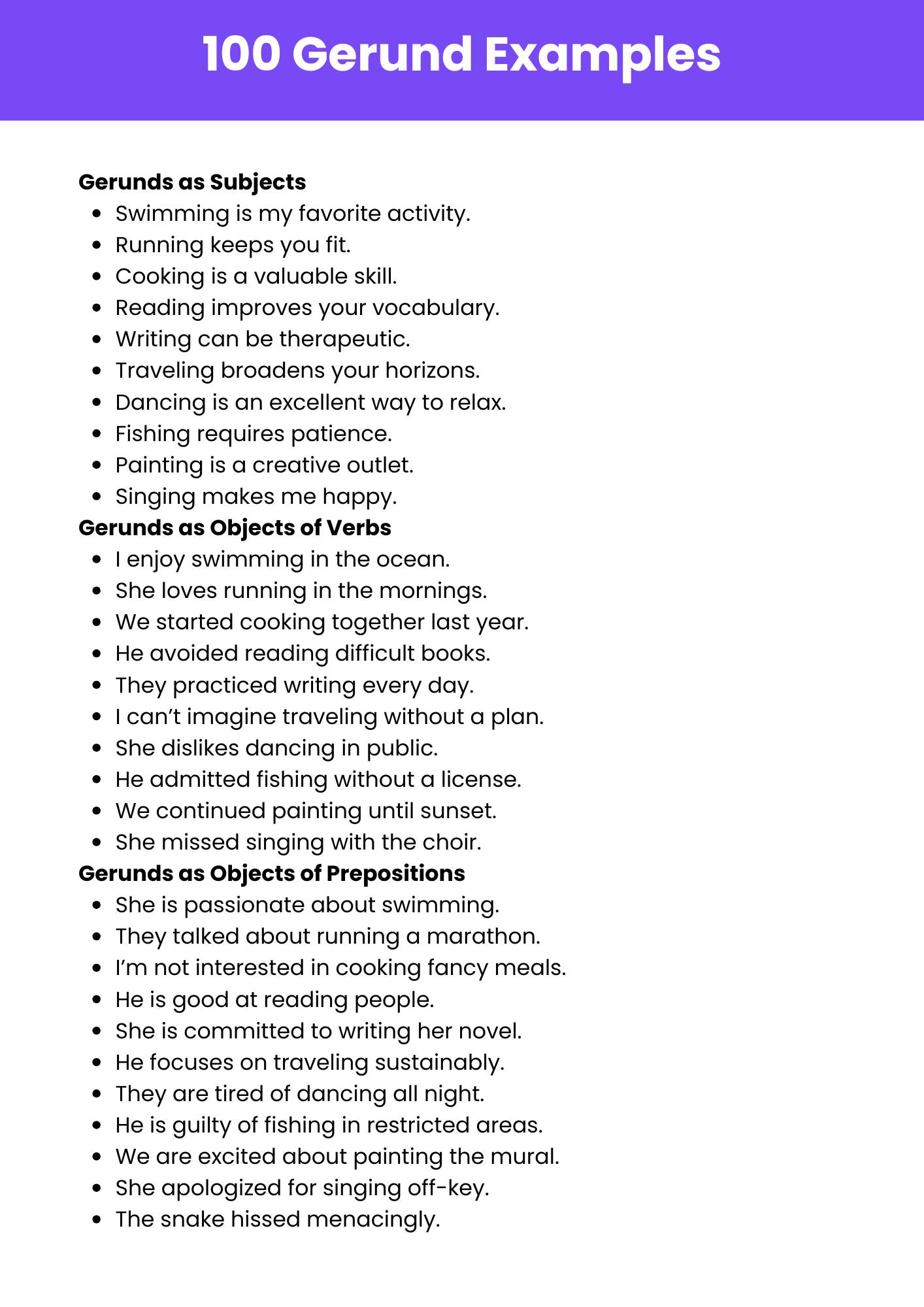Gerund
What is a Gerund? – Definition
A gerund is a verbal noun that is formed by adding -ing to a verb. It functions as a noun in a sentence, allowing the action of the verb to be treated as a subject, object, or complement.

Generated Gerund Examples

Examples of Gerund
- Running is a great way to stay healthy.
- Swimming helps improve cardiovascular fitness.
- Reading expands your knowledge and vocabulary.
- Writing helps clarify your thoughts.
- Typing quickly is essential for this job.
- Coding can be both challenging and rewarding.
- Playing the piano requires practice.
- Photographing sunsets is a popular hobby.
- Drinking coffee in the morning energizes me.
- Flying high above the clouds is exhilarating.
- Lifting weights builds muscle strength.
- Painting landscapes allows for creative expression.
- Cooking new recipes is a fun and rewarding activity.
- Reading novels enhances your vocabulary and comprehension.
- Drawing detailed sketches improves artistic skills.
- Filming documentaries requires meticulous planning.
- Gaming competitively demands quick reflexes and strategy.
- Biking through the countryside offers a sense of freedom.
- Traveling abroad broadens your cultural horizons.
- Crafting handmade jewelry requires patience and creativity.
- Singing in the choir brings joy to both the singer and the audience.
- Learning new languages opens up numerous opportunities.
- Exercising regularly promotes overall well-being.
- Dining out with friends strengthens social bonds.
- Designing websites combines creativity with technical skills.
- Directing films allows artists to bring their visions to life.
- Competing in tournaments tests your gaming skills.
- Cycling to work is an eco-friendly transportation method.
- Exploring new cultures broadens your perspective.
- Painting murals adds vibrant colors to public spaces.
Types of Gerund
Subject Gerund
A gerund that acts as the subject of a sentence.
- Swimming is fun.
- Reading improves your knowledge.
- Cooking requires patience.
- Writing is a valuable skill.
- Jogging keeps you fit.
Object Gerund
A gerund that functions as the object of a verb in a sentence.
- She enjoys painting.
- They discussed traveling abroad.
- He avoids eating late at night.
- We appreciate your helping us.
- They considered moving to a new city.
Complement Gerund
A gerund that serves as a complement to a linking verb, providing more information about the subject.
- Her favorite hobby is gardening.
- His passion became teaching.
- Their main concern was losing the game.
- My goal is improving my writing skills.
- Their achievement was completing the marathon.
Objective Gerund
A gerund that functions as the object of a preposition in a sentence.
- She is interested in learning new languages.
- They talked about traveling together.
- He apologized for being late.
- We are committed to improving our services.
- They succeeded in winning the competition.
Possessive Gerund
A gerund preceded by a possessive noun or pronoun, indicating ownership of the action.
- John’s running keeps him fit.
- Their singing fills the room with joy.
- Her painting is displayed in the gallery.
- Our traveling has been postponed.
- Their cooking delights everyone at the party.
Objective Complement Gerund
A gerund that serves as an objective complement, providing more information about the object.
- She found his singing delightful.
- They consider him studying abroad necessary.
- We elected her leading the team.
- They made him acting in the play his duty.
- I consider swimming daily essential for my health.
How to Identify/Find Gerund?
To identify a gerund, look for words ending in -ing that function as nouns within a sentence. They can act as subjects, objects, or complements.
- Identify words ending with -ing used as nouns.
- Check if the -ing word is acting as a subject, object, or complement.
- Determine if the -ing word refers to an action or activity.
- Look for sentences where the -ing word replaces a noun.
- Observe if the -ing word can be preceded by possessive nouns or pronouns.
How to Use Gerund?
Use gerunds to add variety and depth to your writing by incorporating actions as nouns. They can help create more engaging and dynamic sentences.
- Incorporate gerunds as subjects to emphasize actions.
- Use gerunds as objects to diversify sentence structures.
- Apply gerunds in complements to add descriptive detail.
- Combine gerunds with other grammatical elements for complex sentences.
- Balance gerunds with other noun forms to maintain readability.
Other Gerund Examples
Gerund in Daily Writing
Everyday writing can utilize gerunds to enhance sentence structure and clarity.
- I enjoy reading books in my free time.
- Swimming helps me relax after a long day.
- Cooking dinner is something I look forward to.
- Writing essays improves my critical thinking skills.
- Jogging every morning keeps me energized.
Gerund Examples for Kids
Introduce children to gerunds with simple and relatable examples that demonstrate their usage.
- I love playing with my friends.
- Reading stories before bed is fun.
- Drawing pictures makes me happy.
- Building sandcastles is exciting.
- Flying kites on a windy day is enjoyable.
Gerund Examples for Students
Provide students with examples that showcase the versatility and importance of gerunds in academic writing.
- Using gerunds effectively can enhance the flow of your essays.
- Incorporating gerunds allows for more dynamic sentence structures.
- Mastering gerunds is essential for advanced grammatical proficiency.
- Analyzing gerund usage can improve your analytical writing skills.
- Understanding gerunds contributes to clearer and more precise communication.
Gerund Examples for Class 4
Age-appropriate and engaging gerund examples for younger students to grasp the concept easily.
- I love playing with my toys.
- Drawing pictures is fun.
- Flying kites makes me happy.
- Swimming in the pool is refreshing.
- Baking cookies is delicious.
Explore Other Literary Devices
Elevate Your AP English Preparation
Unlock your potential with our comprehensive AP English exam preparation tools designed to help you excel.
- Extensive Question Bank: Access 900+ exam-like questions for both AP English Language and Literature.
- Expertly Crafted: Questions mirror the structure and difficulty of actual AP exams, ensuring relevant practice.
- Detailed Explanations: Understand your mistakes with clear, concise breakdowns of correct and incorrect answers.
- Personalized Learning: Tailor your study sessions with topic-specific tests and adaptive learning tools.
- Comprehensive Coverage: Master all aspects of the AP English curriculum with extensive guides and resources.
Frequently Asked Questions
-
What is the full meaning of gerund?
A gerund is a verbal noun that ends in -ing and functions as a noun within a sentence, serving as a subject, object, or complement. -
What is a gerund vs present participle?
Both gerunds and present participles end in -ing, but gerunds function as nouns, while present participles act as adjectives or form continuous verb tenses. -
What is an example of a gerund?
A common example is “Swimming is my favorite hobby,” where “Swimming” functions as the subject of the sentence. -
What is the synonym of gerund?
There isn’t a direct synonym for gerund, but terms like “verbal noun” or “noun derived from a verb” are closely related. -
Is gerund good or bad?
Gerunds are neither inherently good nor bad; they are a grammatical tool used to add variety and depth to sentences by turning actions into nouns. -
Who coined the term gerund?
The term “gerund” comes from the Latin word “gerundium.” Its usage in English grammar was established through the study of Latin and traditional grammar rules.

